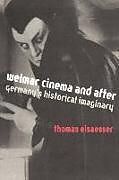Weimar Cinema and After
Einband:
Kartonierter Einband
EAN:
9780415012355
Untertitel:
Germany's Historical Imaginary
Genre:
Medien & Kommunikation
Autor:
Thomas Elsaesser
Herausgeber:
Taylor & Francis Ltd (Sales)
Anzahl Seiten:
480
Erscheinungsdatum:
15.06.2000
ISBN:
978-0-415-01235-5
Zusatztext 'A monumental work of research by any standard.' - Sight and Sound Informationen zum Autor Thomas Elsaesser is at the University of Amsterdam Klappentext German cinema of the 1920s is still regarded as one of the "golden ages" of world cinema. Films such as The Cabinet of Dr. Caligari, Nosferatu and The Blue Angel are among the key films defining an age of Germany as a nation uneasy with itself. Directors such as Fritz Lang, F.W. Murnau and G.W. Pabst, having apparently announced the horrors of fascism while testifying to the traumas of a defeated nation, cast long shadows over German cinema to this day.Weimar Cinema and After offers a fresh perspective on the arguments which view genres and movements such as "films of the fantastic", "Nazi Cinema", "film noir" and "New German Cinema" as typically German contributions to twentieth century visual culture. Elsaesser questions conventional readings which link these genres to romanticism and expressionism and offers new approaches to analyzing national cinema. Zusammenfassung Offers a fresh perspective on this most 'national' of national cinemas, re-evaluating the arguments which view genres and movements as typically German contributions to twentieth century visual culture. Inhaltsverzeichnis 1. Haunted Screens, Caligari's Cabinets and a German Studio-System 2. In the Realm of the Look: Lang, Lubitsch, Murnau and Pabst 3. Transparent Duplicities: Comedy, Opera, Operetta 4. After Weimar: Avantgarde and Modernisation, Emigration and Film Noir
'A monumental work of research by any standard.' - Sight and Sound
Autorentext
Thomas Elsaesser is at the University of Amsterdam
Klappentext
German cinema of the 1920s is still regarded as one of the "golden ages" of world cinema. Films such as The Cabinet of Dr. Caligari, Nosferatu and The Blue Angel are among the key films defining an age of Germany as a nation uneasy with itself. Directors such as Fritz Lang, F.W. Murnau and G.W. Pabst, having apparently announced the horrors of fascism while testifying to the traumas of a defeated nation, cast long shadows over German cinema to this day.Weimar Cinema and After offers a fresh perspective on the arguments which view genres and movements such as "films of the fantastic", "Nazi Cinema", "film noir" and "New German Cinema" as typically German contributions to twentieth century visual culture. Elsaesser questions conventional readings which link these genres to romanticism and expressionism and offers new approaches to analyzing national cinema.
Zusammenfassung
Offers a fresh perspective on this most 'national' of national cinemas, re-evaluating the arguments which view genres and movements as typically German contributions to twentieth century visual culture.
Inhalt
1. Haunted Screens, Caligari's Cabinets and a German Studio-System 2. In the Realm of the Look: Lang, Lubitsch, Murnau and Pabst 3. Transparent Duplicities: Comedy, Opera, Operetta 4. After Weimar: Avantgarde and Modernisation, Emigration and Film Noir

Leider konnten wir für diesen Artikel keine Preise ermitteln ...
billigbuch.ch sucht jetzt für Sie die besten Angebote ...
Die aktuellen Verkaufspreise von 6 Onlineshops werden in Realtime abgefragt.
Sie können das gewünschte Produkt anschliessend direkt beim Anbieter Ihrer Wahl bestellen.
Loading...
Die aktuellen Verkaufspreise von 6 Onlineshops werden in Realtime abgefragt.
Sie können das gewünschte Produkt anschliessend direkt beim Anbieter Ihrer Wahl bestellen.
| # | Onlineshop | Preis CHF | Versand CHF | Total CHF | ||
|---|---|---|---|---|---|---|
| 1 | Seller | 0.00 | 0.00 | 0.00 |
